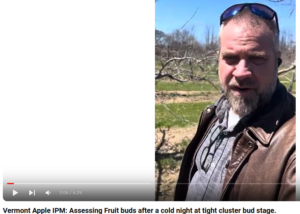Good afternoon:
I was a bit surprised to see how cold it got this morning, despite not having any frost on my windshield at 6:00 am. We recorded 25.7 degrees Fahrenheit in South Burlington, 21.6 in East Montpelier, 27.3 in Cornwall, 26.3 in Putney, as general examples. Definitely colder that the 30 or so that I was expecting. Fruit buds at the UVM orchard in South Burlington are generally at the tight cluster stage, and the general consensus is that buds at that stage see damage at 27 degrees and may have full crop loss at 21 degrees. I pinched some buds and saw some damage that I outline in this video, for those of you who want to keep an eye on things yourselves:

Some browning in some fruit buds may be expected, depending on where you are at and how cold it got. But it’s still early- buds may recover from slight freezing, and there is a good bit of time to go before bloom. For those who are concerned, please know that I generally won’t recommend any miracles you can put in a spray tank. There are a lot of materials out there that purport to save fruit from frost but a lack of good research on many of them. That said, this is a great time to apply Dr. Warren Stiles’ ‘cold weather prebloom cocktail’ of nitrogen (urea (3 lb./100 gallons dilute, or one of the liquid formulations like N-Pact at label rate), zinc (use label rate of your favorite product) and boron (0.1 -0.3 lb. B/acre) that will help top strengthen fruit buds going into bloom.
As I said before, keep fungicides on ahead of expected rains. The weather the past few days may or may not have led to an apple scab infection period, but we may be facing a pretty substantial one early next week.
—
Where trade names or commercial products are used for identification, no discrimination is intended and no endorsement is implied. Always read the label before using any pesticide. The label is the legal document for the product use. Disregard any information in this message if it is in conflict with the label.
The UVM Tree Fruit and Viticulture Program is supported by the University of Vermont Agriculture Experiment Station, UVM Extension, USDA NIFA E-IPM Program, and USDA Risk Management Agency.
UVM Extension helps individuals and communities put research-based knowledge to work. University of Vermont Extension, and U.S. Department of Agriculture, cooperating, offer education and employment to everyone without regard to race, color, national origin, gender, religion, age, disability, political beliefs, sexual orientation, and marital or familial status.
